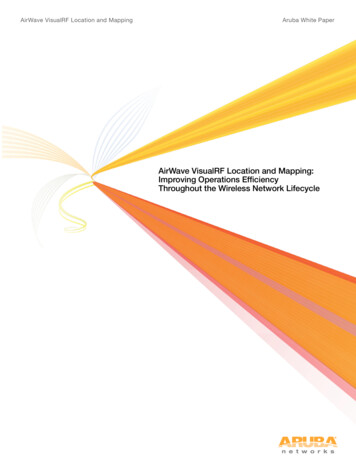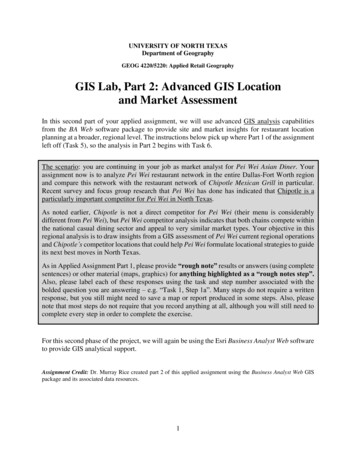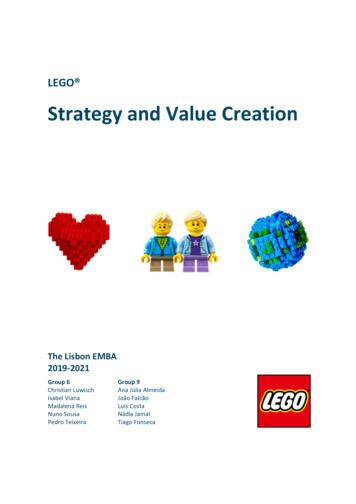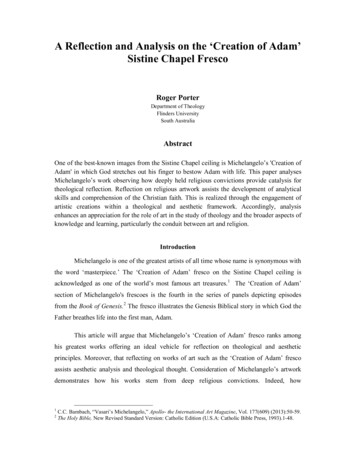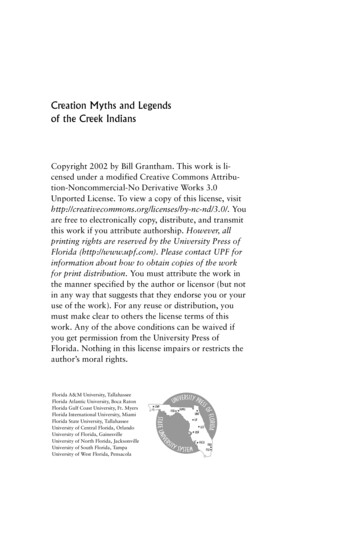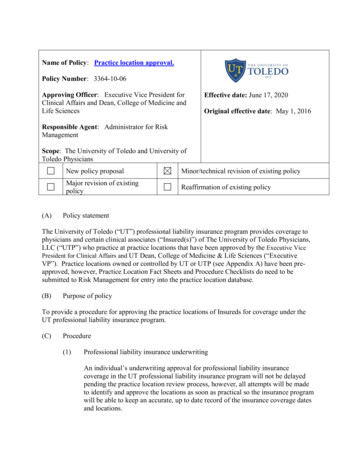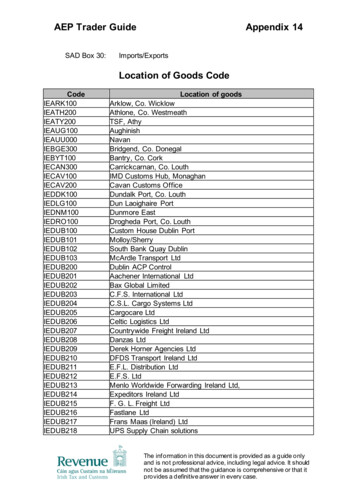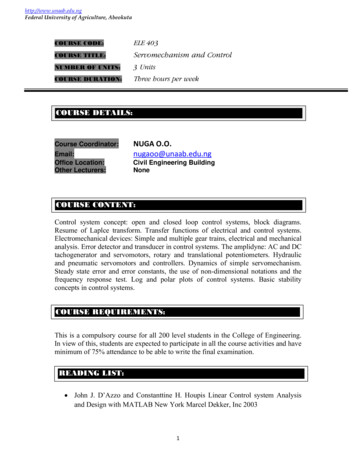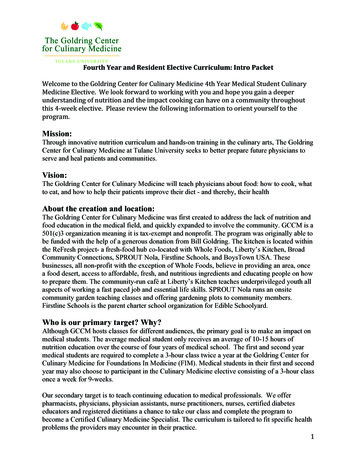
Transcription
Fourth Year and Resident Elective Curriculum: Intro PacketWelcome to the Goldring Center for Culinary Medicine 4th Year Medical Student CulinaryMedicine Elective. We look forward to working with you and hope you gain a deeperunderstanding of nutrition and the impact cooking can have on a community throughoutthis 4-week elective. Please review the following information to orient yourself to theprogram.Mission:Through innovative nutrition curriculum and hands-on training in the culinary arts, The GoldringCenter for Culinary Medicine at Tulane University seeks to better prepare future physicians toserve and heal patients and communities.Vision:The Goldring Center for Culinary Medicine will teach physicians about food: how to cook, whatto eat, and how to help their patients improve their diet - and thereby, their healthAbout the creation and location:The Goldring Center for Culinary Medicine was first created to address the lack of nutrition andfood education in the medical field, and quickly expanded to involve the community. GCCM is a501(c)3 organization meaning it is tax-exempt and nonprofit. The program was originally able tobe funded with the help of a generous donation from Bill Goldring. The kitchen is located withinthe ReFresh project- a fresh-food hub co-located with Whole Foods, Liberty’s Kitchen, BroadCommunity Connections, SPROUT Nola, Firstline Schools, and BoysTown USA. Thesebusinesses, all non-profit with the exception of Whole Foods, believe in providing an area, oncea food desert, access to affordable, fresh, and nutritious ingredients and educating people on howto prepare them. The community-run café at Liberty’s Kitchen teaches underprivileged youth allaspects of working a fast paced job and essential life skills. SPROUT Nola runs an onsitecommunity garden teaching classes and offering gardening plots to community members.Firstline Schools is the parent charter school organization for Edible Schoolyard.Who is our primary target? Why?Although GCCM hosts classes for different audiences, the primary goal is to make an impact onmedical students. The average medical student only receives an average of 10-15 hours ofnutrition education over the course of four years of medical school. The first and second yearmedical students are required to complete a 3-hour class twice a year at the Goldring Center forCulinary Medicine for Foundations In Medicine (FIM). Medical students in their first and secondyear may also choose to participant in the Culinary Medicine elective consisting of a 3-hour classonce a week for 9-weeks.Our secondary target is to teach continuing education to medical professionals. We offerpharmacists, physicians, physician assistants, nurse practitioners, nurses, certified diabeteseducators and registered dietitians a chance to take our class and complete the program tobecome a Certified Culinary Medicine Specialist. The curriculum is tailored to fit specific healthproblems the providers may encounter in their practice.1
Who do we teach? Adult Beginning Community ClassAdult Intermediate Community ClassFamily Community ClassSenior Community ClassMedical Professional CME ClassMedical Student Elective (1st and 2nd years)Medical Student/Community Hybrid ClassNutrition in Pregnancy ClassInterdisciplinary Seminars for medical studentsMore info on classesWho will you see at the kitchen? Chef Leah Sarris, RD, LDN – Director of Operations GCCMChef Kerri Dotson, RDN, LDN, Culinary Medicine Educatoro If you’re interested in shadowing Kerri in her nutrition counseling sessions,please see the HIPAA certification form in the box folderChef Emily Schlag, RD, LDN – Culinary Medicine EducatorColleen (CJ) McCullough – Research DirectorKatie Pedroza and Callie Rubbins-Breen – Culinary Medicine Educators (part-time,community only)Culinary Nutrition interns à 13-week internship from Johnson and WalesUniversityDietetic interns à 1 intern at a time each 2 weeksPublic service/service learning volunteers à Undergrad or MS1/MS2 TulanestudentsCommunity volunteersCourse Objectives: Obtain the 25 hours of nutrition education recommended by NASBecome proficient in clinical nutrition educationBecome proficient in teaching cooking classes to medical students, residents,community members and speaking about culinary nutrition in scientific andlayman’s termsUse clinical knowledge to teach first and second year medical students, via leadingdiscussions and STEP-style case studiesDevelop a comprehensive understanding of the interaction between food andmedicineDevelop an understanding of the Mediterranean Diet and its associated healthbenefitsObserve nutrition counseling with our in-house dietitian2
Assist staff with curriculum development and recipe buildingComplete a month-long project (topic to be assigned on day 1 of rotation)Complete a brief research project on a nutrition trend or topic of interestLearn basic culinary skills and kitchen management skillsInterdisciplinary work with chefs, dietitians, physicians, med students, dieteticinterns, culinary nutrition internsExpectations: Plan to report to the kitchen M-F 9 am – 5 pm; speak with culinary interns eachweek to discuss scheduling variations based on class loadAt least 1 MS4 must be present for each class, including nights and weekend classes.If you are assigned to stay for an evening class, you should arrive at noon that dayand leave by 8:30 pm.Complete assigned GCCM development projectComplete 1-2 page research paper on a culinary health topic of interestAssist culinary interns in kitchen maintenance. This will include class prep andcleaning.Attire: Dress casually and comfortably, as you will be working with food productsevery day. Long pants and close toed shoes are REQUIRED in the kitchen, as well asa hat, headband, or hairnet (men and women)Lunch is provided every day; dinner is included with evening classesCurriculum:Much of the core curriculum will be self-guided using our med student and professionalmodules. You will be responsible for following the med student elective coursework aswell as some of the professional condition and disease specific courses. Each module hasvideos and accompanying reading. This should help you understand the foundation of theMediterranean diet and basic principles that we teach. There are a total of 24 CDS courses;you are responsible for the first eight.All course work can be found on Moodle (culinarymedicine.org/moodle) or Box.com. Tocreate a Moodle account, self-enroll as a student to the Tulane Professional Student Classusing the enrollment key “gccmprof2!”. Please see these instructions for more informationon using moodle, box.com, and iCal, which we use for scheduling.Week 1: Learn the Mediterranean diet Become familiar with our classes Guide clinical discussion in medical student classes Complete Safety and Sanitation module Complete module 1: Introduction to Culinary medicine Complete module 2: Weight Management & Portion Control3
Week 2: Lead the discussion at community classes Lead discussion for resident classes Complete module 3: Fats Complete module 4: Food Allergy and IntoleranceWeek 3: Lead at least one knife demo and kitchen tour Complete module 5: Proteins, Amino Acids, Vegetarian Diets, Eating Disorders Complete module 6: Sodium, Potassium, HypertensionWeek 4: Understand how to research, support/dispel nutrition trends Have developed scripts on counseling patients for common dietary interventions Cook one team lunch Complete module 7: Carbohydrates Complete module 8: The Pediatric DietFor your own education: topics of other CDS modules include: Sports Nutrition Nutrition in HIV and AIDS Cancer Nutrition Geriatric Diet Nutrition in Pregnancy Mindfulness, MotivationalInterviewing Diabetes and HTN in Pregnancy Eating Disorders Celiac Disease Myths, Fads, Diets, & Controversies Food Allergy Polycystic Ovarian Syndrome Anti-Inflammatory Diet Bariatric Surgery IBS, IBD, & GERD CHFYou will also be helping out with nightly community classes. Their curriculum follows a 6week course, with the following topics: Lesson 1: Mediterranean Diet, Introduction to Cooking and Reading Recipes Lesson 2: Macronutrients, Mediterranean Diet: Dairy, Breakfast, and understandingnutrition labels Lesson 3: Mediterranean Diet: legumes, Good Shopping Habits, and DelectableDinners Lesson 4: Protein, Mediterranean Diet: Vegetables, Portion Sizes, and Lunch Lesson 5: Carbohydrates, Mediterranean Diet: Fruits and Nuts, Snacking andDesserts, Sweeteners and “Rethink Your Drink” Lesson 6: Mediterranean Diet: Fats and CholesterolMonthly Project4
You will receive your project assignment within your first few days of arriving at thekitchen. If you have any specific interests, please let Leah know so she can tailor yourassignment to your interests. Past assignments have included: curriculum development,recipe testing, price comparisons, etc.Lunchtime Discussion ProjectYou are also expected to complete a short summary of research on a specific diet trend or hottopic in nutrition of your choice. Include whether there is enough valid research to back upclaims behind the trends. Topics in the past have included Paleo diet, low carb no-carb diet, thenutritional qualities of coconut oil. See past presentations here. Include at least 3 references andproper citations.Daily DutiesIn addition to your research project, your day-to-day activities will include helping theculinary interns maintain the kitchen and run classes. This will be an excellent opportunityto see how a kitchen operates. Tasks will be assigned by the culinary interns and willinclude:Kitchen maintenance: Help culinary interns prepare for classes: this includes tray set up (portioning outfood into the exact amounts required for class) and station set-up. This will requirearriving 30 minutes prior to class. Kitchen is clean: dishwasher, sinks, floors, coolers, dry-storage, & bathroom Refresh herbs with wet paper towels Thaw proteins for next day classes (Fish/Seafood, Beef/Pork, Ground Meat, Poultry) Set-up & breakdown for class Keep up with filing/office dutiesClasses: Your role will vary depending on the class. You should always be looking foropportunities to interject your culinary nutrition/medical knowledge wheneverpossible – for community members, medical students, and even residents! You are expected to help with cooking and cleaning during class. To be mostefficient, you should look at each recipe before class begins to be able to answerparticipants’ questions. Encourage participants to clean as they go – the more workthey do during class, the less you will have to do afterwards. In general, classes are times where you will be working very hard; but it also has theopportunity for you to get a lot out of it. If you are concerned that you are notlearning or benefiting from these experiences, please discuss this with the culinaryinterns and/or Chef Leah.Weekly schedule:The schedule will change depending on how many classes are each week; you will likelyexperience a variety of schedules while you are here. In general:- Shopping is done on Mondays Fridays5
-Trays for classes are done Monday and Wednesday (Plan to help the interns withtray set up)Weekly cleaning is done on Fridays. This is done most efficiently when MS4s andJWU interns work together, so please block out time in your schedule for thiscleaningWe eat lunch as a team every day; the culinary interns are responsible for preparinglunch, but feel free to come up with your own recipes or help them cook if you’reinterested!Friday Feedback lunches: weekly reflection rounds with emphasis on what wentwell and what could be improved for the next week. We will use this time to go overthe schedule for the following week.Knife Skills Demo:At the start of every first class, there is a knife skills demo. This gets set up on the frontcounter with cutting board, mise en place cups, three 1/6 pans, a chef knife, bench scraper,garlic, onion, and celery/carrot. For the intermediate class, we demonstrate how to cut apotato. It will be your responsibility to do these demos after watching one or two.Key points to mention:6
§§§§§Trash, treasure, and compost binsPaper towel under cutting boardMise en place cups: organization & save times during cookingHow to hold a knife & cutting motionBear claw with other hand for safety§§§Keeping an uncluttered cutting boardDice & julienne onion, explaining uniformity of cutsCelery: half moons, then planks, julienne & diceGarlic: how to peel & minceLet people know where you are & basic kitchen safety§§Station Set Up:7
Lesson 1: Mediterranean Diet, Introduction to Cooking and Reading Recipes . Topics in the past have included Paleo diet, low carb no-carb diet, the nutritional qualities of coconut oil. See past presentations
